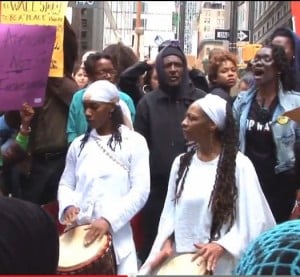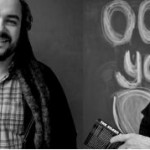If the spirituality of the Occupy Generation as an ongoing dialogue between experience and concept – what is the nature of that experience? How is it grounded in daily practice? From our intensive conversations with many young people, we gained an exciting picture of solidly practical, embodied, and yet deeply mystical spirituality.

An Excerpt from Chapter 2 of Occupy Spirituality: A Radical Vision for a New Generation
by Adam Bucko and Matthew Fox, published by North Atlantic Books, copyright © 2013. Reprinted by permission of publisher.
ADAM BUCKO: A third point in this new spirituality is that practice goes beyond traditional contemplative exercises. People still practice meditation and contemplative prayer, but this new spirituality understands that the journey needs to include good psychology and shadow work, as well as integration of the body through things like yoga, sacred sexuality, and deep human relationships. This includes conscious romantic relationships as a path into life and into spirituality. Basically this new spirituality expands the focus of transformation from just one dimension of our being—the soul—to all aspects of our being.
As one young woman told us: “The spirituality that my generation is interested in is personal, nonstructured and all-encompassing. We tend to use numerous methods to deepen spiritual experience, including nature, yoga, meditation, conscious-community, art, and activism. We take and blend what we believe serves our spiritual path from numerous sources, including religion, ritual, psychology, and movement. Because it is sourced from our personal experience, we don’t feel pressured or compelled to conform to a specific teaching or institution.”
MATTHEW FOX: Yes, and included too, I think, would be the role of creativity as a path, as a spiritual discipline, as a yoga—what I’ve called and practiced, through thirty-some years of teaching spirituality, “art as meditation.” So that focusing through clay, through dance, through painting, through music, and so forth—that too is meditation, and that too incorporates the body. All art is bodily. And that can be missed. Of course, for many people, it also includes athletics, sport—running or climbing or walking or hiking. These should not be denigrated as inferior, so long as you bring your heart and your focus to it.
I know people who run on a treadmill while listening to discourses on spirituality and mysticism and so forth. So again, I think the world has opened up so much, and part of it is the availability of electronic teaching devices—and music, of course—that there are so many more ways to practice spirituality. Massage too. And they’re all saying what you’re saying, that including the body is including the soul. It’s not leaving it at the door. And in a way, I think, we may be just beginning as a species to integrate in this regard.
ADAM BUCKO: I think it’s a completely new development as a species.
MATTHEW FOX: And yet, of course, if you look back to olden times, the work, for example, that the monks did, and the struggle to survive that our species has gone through at so many times in so many cultures, that very much included the body. The monastic vision was that work is prayer, too—working in the fields or carving the stones for the buildings in which you’re living, and so forth—that all of work can be prayer, as part of carrying your meditative consciousness with you. You can take that consciousness wherever you go.
As a Dominican, I was taught that study is also prayer, so study can be a spiritual practice—and needs to be. When we secularize study, which we ’ve done in our culture, you get bad results. You get very unhappy professors, you really do. You get people set up for addiction, and you have a joyless educational project. The joy is missing, because facts in themselves, knowledge in itself, does not satisfy the soul. There ’s something deeper that we yearn for and ache for, and that needs to be integrated in all of our life efforts.
In our next post we explore the Occupy Generation’s passionate blending of spirituality with service and activism: their belief that to be spiritual demands taking a stand for justice and for the earth.
Till then, we invite your thoughts: How do you ground your spirituality in experience? Do you experience your spirituality as an embodied part of your being, and physical practices as gateways to mystical experience?
__________________________________________________________
Don’t miss the Occupy Spirituality Book Club on Patheos, September 16-30!
See when Matthew Fox and Adam Bucko will be speaking about Occupy Spirituality in your area: http;//www.matthewfox.org/calendar











